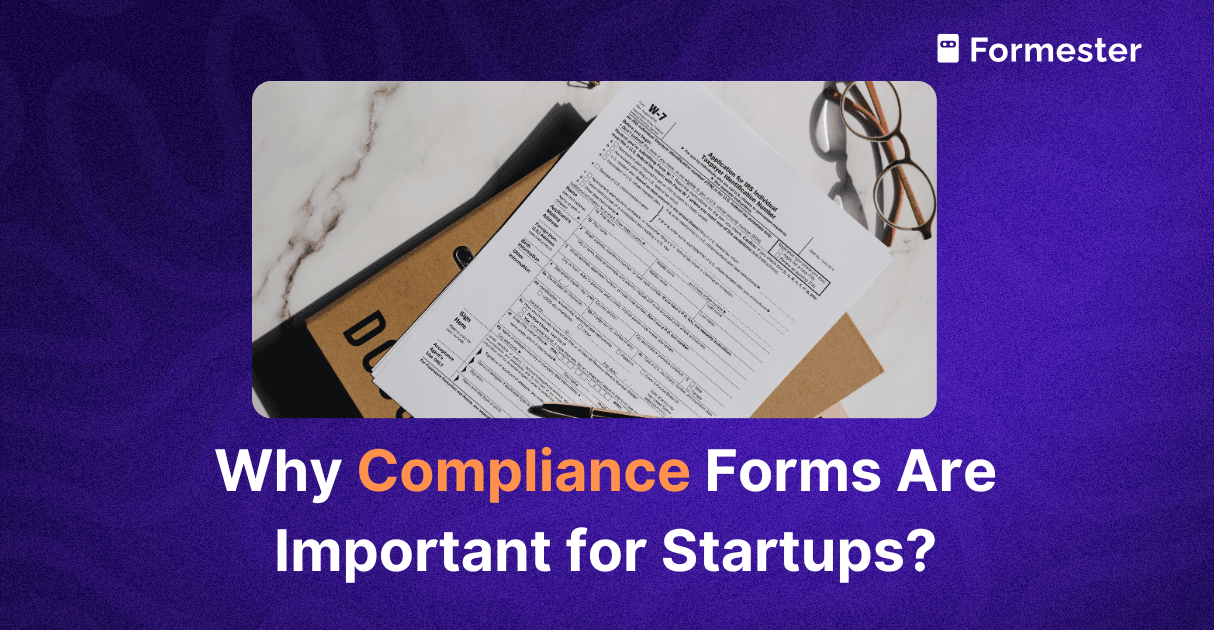Why Compliance Forms Are a Must-Have for Every Startup

When you’re launching a startup, it’s easy to get caught up in product, pitch decks, and pushing for growth. But the compliance stuff? That proverbial can often get kicked down the road. Until it becomes a problem, that is.
The truth is, startups aren’t exempt from legal obligations just because they’re small or “moving fast and breaking things.” So, regardless if you’re solo in your mom’s garage or have a five-person team and funding, you’re still expected to follow the rules.
Skipping compliance might save you time in the short term, but it can cost you big down the line. Think lost investor interest during due diligence, messy disputes over intellectual property, or even state penalties for operating without proper filings. Worse, it can cast doubt on your professionalism, something no founder wants when courting partners or customers.
With all of that in mind, this article discusses the most essential compliance forms your startup should have on hand, including NDAs, IP agreements, and operating documents. We’ll also cover when to use them and how they intersect with business structure choices.
What Are Compliance Forms and Why Do They Matter?
Compliance forms are more than just stacks of documents for your filing cabinet. Ultimately, they’re internal and external tools that help certify your startup follows legal, regulatory, and operational standards from launch day.
Think of them as your startup’s armor. They insulate your ideas, define your team’s responsibilities, and help you avoid the kinds of messy disputes that can derail momentum. Without them, you’re operating in the “wild wild west” of risk.
Here are some of the most common compliance forms for early-stage startups:
NDAs (Non-Disclosure Agreements): Essential when discussing your idea with partners, contractors, or potential hires. IP Assignment Agreements: Confirms any intellectual property developed for the business belongs to the company, not the individual who created it.
Employment Offer Letters: Clarify roles, responsibilities, compensation, and expectations for new hires.
Operating Agreements: A must-have if you're forming a Limited Liability Company (LLC). They define ownership, management structure, and decision-making processes. For instance, if you're planning on launching in the Sunshine State, any solid guide to starting an LLC in Florida will emphasize the importance of this document.
Data Processing Agreements (DPAs): Key if your startup handles personal data, especially under regulations like GDPR or CCPA. DPAs clarify responsibilities and protect you from compliance risks.
Vendor Agreements: Set clear terms, deliverables, and expectations with third-party service providers. These contracts reduce misunderstandings and protect your interests in case issues arise.
These forms are all considered the legal backbone of any well-run startup.
Other Key Legal Foundations
Even if it’s just you on your own, you should also make sure your business has the following:
Articles of Organization: Filed with your state to officially form your LLC.
Employer Identification Number (EIN): Required for taxes, hiring employees, and opening a business bank account.
Registered Agent: Legally required to receive official documents and legal notices.
When and How to Use These Forms
Another pertinent thing to know is that using compliance forms proactively can prevent hurdle jumping later. Implement these documents early in your startup journey, whether you’re hiring, pitching, or launching.
Here’s when to use specific forms:
Co-founders: Establish a Founders Agreement and maintain an accurate cap table to clarify ownership and roles from day one. Employees or Contractors: Provide Offer Letters that include NDAs and IP assignment clauses to protect your company’s confidential information and intellectual property.
Investors: Use Term Sheets and SAFE or Convertible Note templates to clearly outline investment terms and expectations.
Once signed, store all forms securely using digital platforms like Dropbox Sign, DocuSign, or specialized legal management tools. This guarantees easy access and keeps your documents organized and protected for future reference.
How Compliance Forms Build Credibility
Having your compliance forms in order sends a strong message to investors, vendors, and partners that your startup is serious and well-organized. It shows that you understand the importance of protecting your business and are committed to doing things the right way from the start. This professionalism builds trust and can open doors.
For instance, when raising capital or preparing to sell your business, these documents are used during due diligence. Investors and buyers want to see clear agreements that protect intellectual property, define ownership, and clarify roles. Without them, potential backers might hesitate or undervalue your startup.
Additionally, compliance forms help reduce the risk of costly legal battles related to IP rights, data handling, or ownership disputes. Making sure you have these agreements sets the tone for how your business operates from the get-go.
When to Bring in Legal Help
Starting out, using DIY templates for compliance forms can work well for simple setups. However, there are key moments when it’s smart to consult a lawyer to avoid costly mistakes.
Bring in legal help when:
You’re raising outside funding and need investor-ready documents.
Onboarding employees across multiple states or countries with varying laws.
Dealing with complex IP issues or regulatory compliance, especially if you’re in SaaS, healthcare, or finance sectors.
Getting professional advice at these stages ensures your startup stays protected and compliant as time passes and you focus on growth.
Seal the Deal: Compliance as Your Startup’s Bedrock
Compliance forms aren’t just paperwork, they’re the backbone of a strong, credible startup.
From protecting your intellectual property to building trust with investors and partners, these documents set you up for long-term success. Ultimately, getting your compliance right early helps you avoid legal pitfalls and grow confidently.
Don’t skip this essential step.

